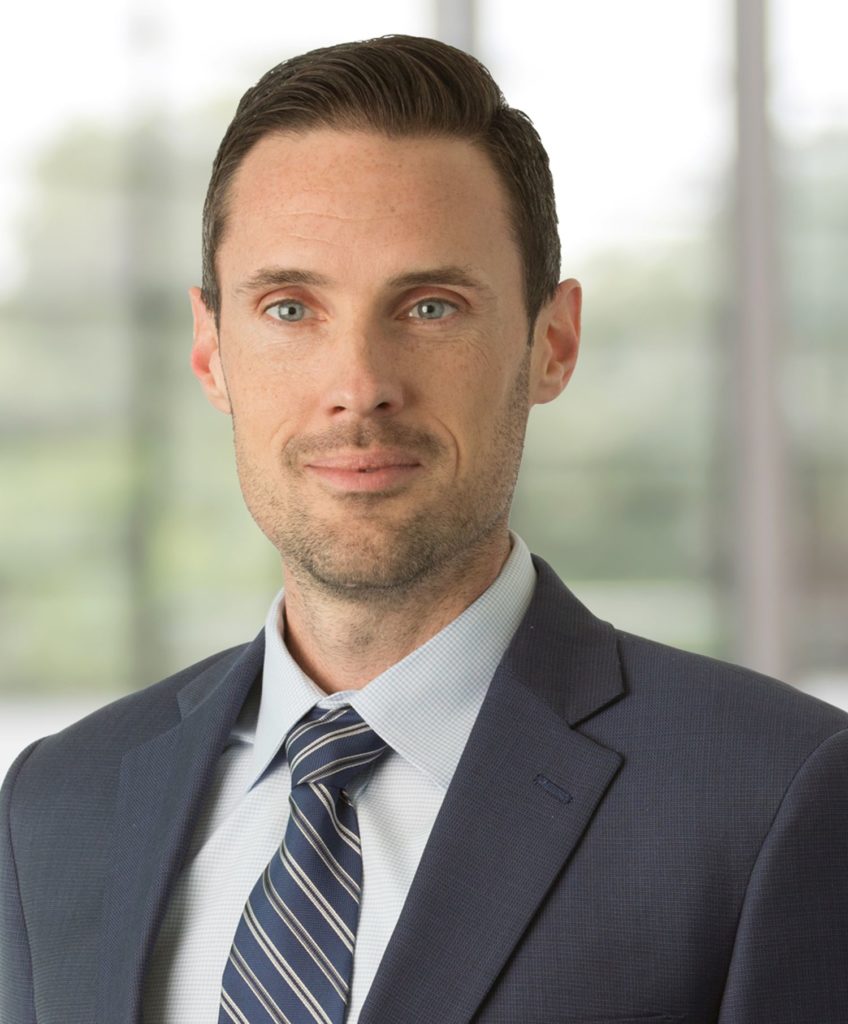Publisher’s note: The following Q&A is the product of a thought leadership series with Dallas legal recruiter Kate Cassidy of Lotus Legal Search. Cassidy started her career in Big Law with Weil Gotshal and Baker Botts before moving in-house to work for the Dallas Stars and later the Texas Rangers, where she was acting general counsel. In “The Corner Office” series, Cassidy will interview leaders in the Texas legal market.
Dallas deal lawyer Brian Bullard wears many hats at Polsinelli. He serves as the Dallas office managing partner, chairs the firm’s investment funds, joint ventures and alternative investment strategies group, and more recently took on a new role as chair office managing partner, where he serves as a direct liaison between the CEO and other office managing partners. In this Q&A, he weighs in on the challenges associated with succession planning at a law firm, what he is seeing in private equity dealmaking, and the benefits of taking a “generalist” approach as a young attorney. Plus, he shares the classic children’s book on repeat at his home.
Kate Cassidy: How is Polsinelli doing in Dallas and nationally?

Brian Bullard: We are doing really well both in Dallas and nationally. As an organization, we’ve been able to achieve many longer-term goals in much less time than initially expected.
I recently took on a new role at Polsinelli as chair office managing partner. In addition to acting as a direct liaison between the CEO, Chase Simmons, and other office managing partners, a large part of my role is to focus on and craft “office strategies” within the markets and geographies where we have a physical presence. With more than 1,000 attorneys and 22 offices across the U.S., we realize that we can’t take a “one size fits all” approach on numerous issues and that we must tailor our strategic focus and messaging to align with our organizational [national] goals within each respective market.
For example, in Texas, we currently have offices in Dallas and Houston. One primary objective over the next 2-3 years is to have and maintain a Texas presence of at least 150 practicing attorneys whose primary focus is to serve private equity clients. Growth within the Texas legal market is an important part of our national strategy, and we intend to proceed deliberately and with thoughtful precision as we continue to expand in Texas.
Cassidy: What is a trend you see in Texas corporate (private equity) work?
Bullard: Identifying a single dominant trend in Texas corporate and private equity work is somewhat challenging as the landscape is diverse and constantly evolving. Below are a few trends our firm has considered as part of its Texas strategy:
Rising Focus on Middle Market Companies: Texas boasts a large and vibrant middle market, making it a target-rich environment for private equity firms seeking attractive investment opportunities. This focus on smaller, established companies with strong growth potential allows private equity firms to capitalize on the state’s diverse and dynamic economy.
Sector Diversity: While energy has traditionally been a dominant sector for Texas private equity, firms are increasingly diversifying their portfolios. Healthcare, real estate, technology, and private credit opportunities are attracting significant interest.
Talent Influx: The influx of people to Texas from coastal cities has definitely impacted the landscape of private equity work in the state. As urban centers such as DFW, Houston, and Austin attract professionals seeking lower costs of living and a business-friendly environment, the demand for private equity investments has surged. This migration has not only stimulated the growth of local businesses but has also intensified competition among private equity firms vying for investment opportunities.
Cassidy: You moved your practice from Akin Gump to Polsinelli years ago. How has that move been for you?
Bullard: Overall, the move was extremely positive from the start. It’s been nearly seven years since I moved my practice to Polsinelli, but it doesn’t feel that long.
I learned so many valuable things at Akin that continue to serve me well today. I had the privilege of having great mentors and experiences early in my career and I’ve worked hard to replicate a lot of the “good” that I experienced while at Akin.
When I made the decision to move to Polsinelli [in 2017] it was to take advantage of a unique opportunity. My practice focuses on providing advice and counsel to private equity firms, investors, sponsors, and other market participants in connection with all aspects of investment management, fund, and joint venture transactions. Polsinelli’s full-service platform, geographic footprint, and collaborative approach toward client onboarding allows me to maintain a dynamic practice that is able to focus on the everyday needs of the private equity client, not just one or two specific aspects of their business. My web bio states that I “seek to partner with my clients…” and Polsinelli fosters a culture that encourages attorneys to take a longer-term approach to client representation. That’s been refreshing and motivating from my perspective.
Cassidy: What has led to your career success?
Bullard: Autonomy. Along with resources, Polsinelli has given me the autonomy to build and grow a diverse practice that is designed to (1) represent private equity clients and (2) intersect multiple industry verticals.
So many large law firms encourage “specialization” too early in my opinion. I worked against the grain a bit as an associate and tried to maintain more of a “generalist” approach to the practice of law. I wanted to see everything and understand all aspects of every deal. I’ve never really been one that likes to “stay in my lane” or “wait my turn.” I think this aligns with how many private equity clients think and how they want their lawyers to think. By the time I was a mid-year associate I realized that private equity clients don’t value the documentation of a deal as much as they value market insight and collaboration on getting a deal done. I think an early recognition of the true value I brought to a transaction from my client’s perspective was also accretive towards any success that I now experience.
Cassidy: What are your thoughts on the debate on attorneys working remotely vs. in office?
Bullard: It’s an interesting debate. If we’re limiting the discussion to attorneys that practice at larger law firms then I think the right answer is likely a hybrid approach that accounts for the realities of the job we do. But I understand the pro/cons on both sides.
Unlike many professions, attorneys at large law firms still maintain accountability through the “billable hour.” As the chair of a practice group, I’m not sure I really care if an hour is billed in an office setting or if it’s billed at home (or by a pool) as long as it’s a quality hours’ worth of work. On the other hand, as a veteran attorney and office managing partner who understands how much value an office setting provides in terms of firm culture, junior attorney training/development, and group collaboration, I think it would be selfish (to our clients and to the next generation of attorneys) to say that remote work without thoughtful parameters is an acceptable path forward.
Like many debates, I’m guessing the solution or compromise will land somewhere in the middle. Over the past year, we’ve experienced an increase in voluntary in-office attendance and all signs point to the new norm being tailored to the realities of the profession.
Cassidy: As the Dallas OMP, what law firm management issue is most relevant to you right now?
Bullard: The issue I probably wrestle with the most is the process through which we navigate certain generational shifts. As seasoned partners approach retirement, there is a vital need to seamlessly integrate younger attorneys into leadership roles while preserving our firm’s core values and institutional knowledge. Balancing the experience of veteran lawyers with the fresh perspectives of younger associates is also crucial for maintaining our firm’s success and relevance. This shift demands that we have a thoughtful and strategic approach to succession planning, mentorship programs, and fostering a collaborative work environment that values the unique strengths and contributions of each generation.
Cassidy: What do you enjoy most about the practice of law?
Bullard: As a transactional lawyer, I would probably say the dynamic and ever-changing nature of each deal. Capital markets and legal landscapes are continuously shifting in response to societal, technological, and global changes. This constant evolution fosters an environment that encourages development of strategic and innovative solutions to complex issues. The evolving nature of each deal also means that there is always room for creativity.
Cassidy: Any career advice for young attorneys?
Bullard: Always. I would start by reiterating that the practice of law is supposed to be a career and not just a job. Embarking on a legal career should feel like a marathon rather than a sprint for young attorneys. It’s crucial to approach the journey with a long-term perspective, recognizing that success in the legal field is built over time. It’s not just about reaching the finish line quickly but about enduring the challenges of the legal terrain and continually improving one’s abilities.
I would also say that cultivating a strong personal brand is essential for career progression. Showcase your expertise and market knowledge through continuous communication – articles, speaking engagements, and in-person client engagement.
Best bet for a successful legal career will likely require a combination of legal acumen, networking, technological proficiency, and a strategic approach to personal branding.
Cassidy: What’s your favorite travel destination?

Bullard: Currently, probably Steamboat, Colorado. My kids are approaching the age where skiing and other mountainous activities are becoming fun. My wife and I have found that Steamboat is really family friendly, and that’s quite often our destination of choice.
Cassidy: What are you reading for fun right now?
Bullard: The Very Hungry Caterpillar… every night for the last two months.
